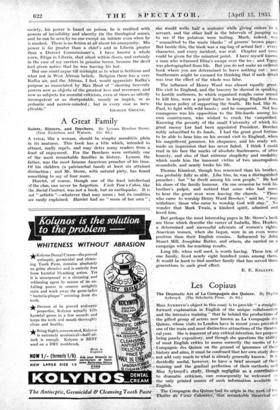A Great Family
Saints, Sinners, and Beechers. By Lyman Beecher Stowe. (Ivor Nicholson and Watson. Hs. 6d.) A TITLE, like a woman, should be simplex mundiliis, plain in its neatness. This book has a title which, intended to attract, really repels, and may deter many readers from a feast of enjoyment. For the Beeehers were certainly one of the most remarkable families in history. Lyman, the father, was the most famous American preacher of his time. Of his children (a patriarchal band) at least six attained . distinction ; and Mr. Stowe, with natural piety, has found something to say of four more.
Harriet, of course, though one of the least intellectual of the clan, can never be. forgotten. Uncle Tom's Cabin, like the Social tonlract, was not a book, but an earthquake. It is not " artistic "—whatever that may mean ; but its crudities, are easily explained. Harriet had no " room of her own " ; she would write . half a sentence While giving orders- to a servant, and the other half in the intervals of jumping up to see if the potatoes were boiling. Much, indeed, was " committed to the waste blanks " of grocers' brown paper. But beside this, the book was rag-bag of actual fact : every character, and every incident, was real. Chapter and verse could be given for the minutest point. I have myself known a man who witnessed Eliza's escape over the ice ; and Tqpsy was photographed from life. But you do not make an ordered book where you are determined to leave nothing out : ')and Southerners might be excused for thinking that if each detail was true the effect of the whole was false.
The influence of Henry. Ward was _ almost equally great. His visit to England, and the bravery he showed in speaking to hostile audiences, to which organized. roughs came armed to kill him,. were a potent factor in keeping England from the insane policy of supporting the South. He had, like St. Paul, to fight with wild beasts ; and he conquered. Not less - courageous was his opposition to the Die-hards among his own countrymen, who wished to crush the vanquiShed. Knowing the poverty of the small University of whiel his _ great enemy Lee had been appointed President, Beecher nobly subscribed to its funds. I had the great good fo;tune . to be able to hear him on his second visit to England, when his magnificent yresence, his eloquence, and his ready wit, made an impression that has never faded. I think I could read in his face the /n arks of absolute fearlessness, of utter honesty, and also of that extreme simplicity and credulity which made him the innocent victim of two unscrupulous scoundrels, and nearly broke his life. Thomas Kinnicut, though less renowned than his brother, was probably fully as able.. _Like him, he Ns-as, a distinguished preacher ; but ‘‘ among his own people." He had his share of the family humour. On one occasion he took his brother's pulpit, and noticed that some who had come to hear the great man were leaving the church. " Those who came to worship Henry Ward Beecher," said he, " may withdraw: those who came to worship God will stay.", No wonder that Mark Twain, a kindred spirit, admired and loved him.
But perhaps the most interesting pages in Mr. Stowe's book are those which describe the career of Isabella, Mrs. Hooker, a determined and successful advocate of women's rights. American women, when she began, were in an even worse position than their English cousins. Influenced by John Stuart Mill, Josephine Butler, and others, she carried on a campaign with far-reaching results. Long life, when well used, is worth having. These ten, of one family, lived nearly eight hundred years among them. It would be hard to find another family that has served three generations to such good effect. E. E. Kr.LiErr.


















































 Previous page
Previous page